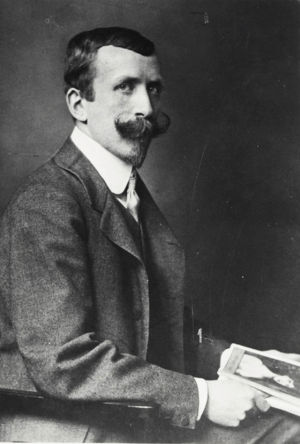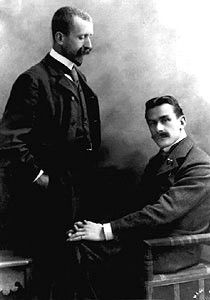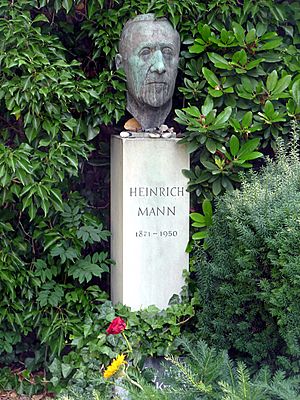Heinrich Mann facts for kids
Quick facts for kids
Heinrich Mann
|
|
|---|---|

Heinrich Mann in his "Munich years" (1894-1899)
|
|
| Born | Luiz Heinrich Mann March 27, 1871 Free City of Lübeck, German Empire |
| Died | March 11, 1950 (aged 78) Santa Monica, California |
| Occupation | Novelist, essayist |
| Notable works | Der Untertan Professor Unrat |
| Relatives | Thomas Johann Heinrich Mann (father) Júlia da Silva Bruhns (mother) Thomas Mann (brother) |
Luiz Heinrich Mann (born March 27, 1871 – died March 11, 1950), known simply as Heinrich Mann, was a German writer. He was famous for his novels that looked closely at society and politics. From 1930 to 1933, he was the head of the poetry section of the Prussian Academy of Arts. He strongly criticized the rise of Fascism and Nazism. This forced him to leave Germany in 1933 when the Nazis took power. He was the older brother of another famous writer, Thomas Mann.
Contents
Early life of Heinrich Mann
Heinrich Mann was born in Lübeck, Germany. He was the oldest child of Thomas Johann Heinrich Mann, who was a senator, a grain merchant, and a finance minister. His mother was Júlia da Silva Bruhns. Heinrich was the older brother of the writer Thomas Mann. The two brothers had a friendly competition throughout their lives.
The Mann family was a wealthy family of grain merchants from Lübeck, a city that was part of the Hanseatic League. After his father passed away, Heinrich's mother moved the family to Munich. There, Heinrich began his career as a freier Schriftsteller, which means a writer who works independently.
Heinrich Mann's Work
Mann's essay about the writer Émile Zola and his novel Der Untertan (published between 1912 and 1918) made him very respected during the Weimar Republic. These works made fun of the old German society from the time of the Empire.
Later, in 1930, his book Professor Unrat was made into a famous movie called Der Blaue Engel (The Blue Angel). Carl Zuckmayer wrote the script, and Josef von Sternberg directed it. Mann wanted his girlfriend, Trude Hesterberg, to play the main female role. However, Marlene Dietrich got the part, and it was her first movie with sound.
In 1932, Heinrich Mann, along with Albert Einstein and other well-known people, signed a document called the "Urgent Call for Unity." This document asked people to vote against the Nazis. Einstein and Mann had also written a letter together in 1931. That letter spoke out against the killing of a Croatian scholar named Milan Šufflay.
Heinrich Mann became an unwanted person in Nazi Germany. He left the country even before the Reichstag fire in 1933. He moved to France and lived in Paris and Nice. When Germany occupied France, he traveled to Marseille. In September 1940, a man named Varian Fry helped him escape to Spain. With help from Justus Rosenberg, Heinrich, his wife Nelly Kröger, his nephew Golo Mann, Alma Mahler-Werfel, and Franz Werfel hiked for six hours across the border.
After reaching Portugal, the group stayed at a hotel in Monte Estoril from September 18 to October 4, 1940. On October 4, 1940, they boarded a ship called the S.S. Nea Hellas and sailed to New York City.
The Nazis burned Heinrich Mann's books on May 10, 1933. This was part of the famous Nazi book burning events. The Nazis said his books were "against the German spirit." This burning was started by the Nazi propaganda minister, Joseph Goebbels.
Later life and Legacy
During the 1930s and later when he lived in America, Heinrich Mann's books became less popular. However, he wrote two important novels: Die Jugend des Königs Henri Quatre and Die Vollendung des Königs Henri Quatre. These books were part of the Exilliteratur, which means literature written by people in exile.
These two novels told the story of Henry IV of France and how important he was. His brother, Thomas Mann, praised them greatly. He said the books had "great splendor and dynamic art." The story was based on early European history from a French point of view. It also suggested an end to the old rivalry between France and Germany.
Heinrich Mann passed away on March 11, 1950, in Santa Monica, California. He was almost 79 years old. He died feeling lonely and without much money. This was just a few months before he was planning to move to East Berlin to become the president of the German Academy of Arts. His ashes were later brought to East Germany. They were buried in a special "grave of honor" at the Dorotheenstadt Cemetery in Berlin.
Heinrich Mann in Popular Culture
- In a 1992 TV show based on the play Tales from Hollywood, Heinrich Mann was played by Alec Guinness.
- In the 2001 TV series Die Manns – Ein Jahrhundertroman, he was played by Jürgen Hentsch.
Film adaptations of Heinrich Mann's Work
- The Blue Angel (1930), based on Professor Unrat.
- Der Untertan (1951), based on Der Untertan.
- The Blue Angel (1959), another version based on Professor Unrat.
- Man of Straw (1972), a TV miniseries based on Der Untertan.
- Henri 4 (2010), based on his novels about Henry IV.
See also
 In Spanish: Heinrich Mann para niños
In Spanish: Heinrich Mann para niños
- Exilliteratur
- Dohm-Mann family tree
- Urgent Call for Unity



